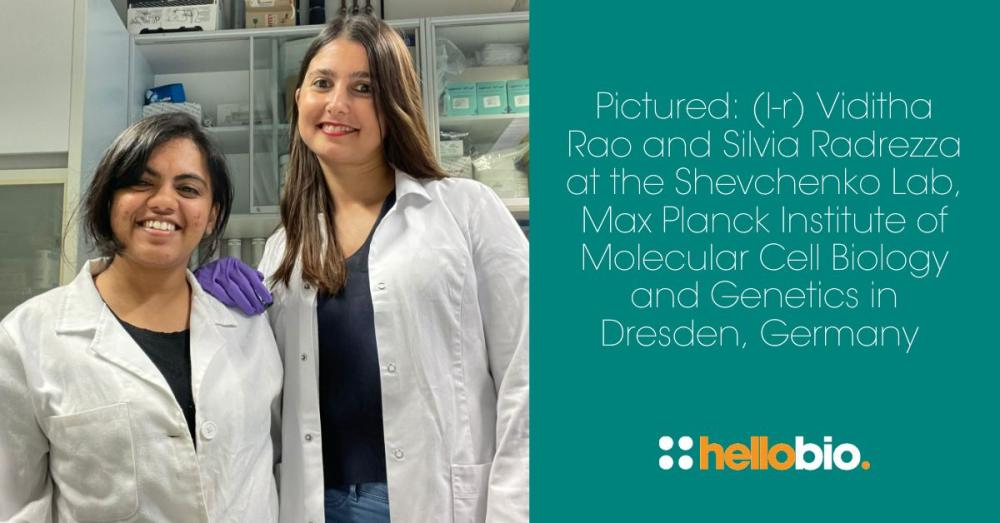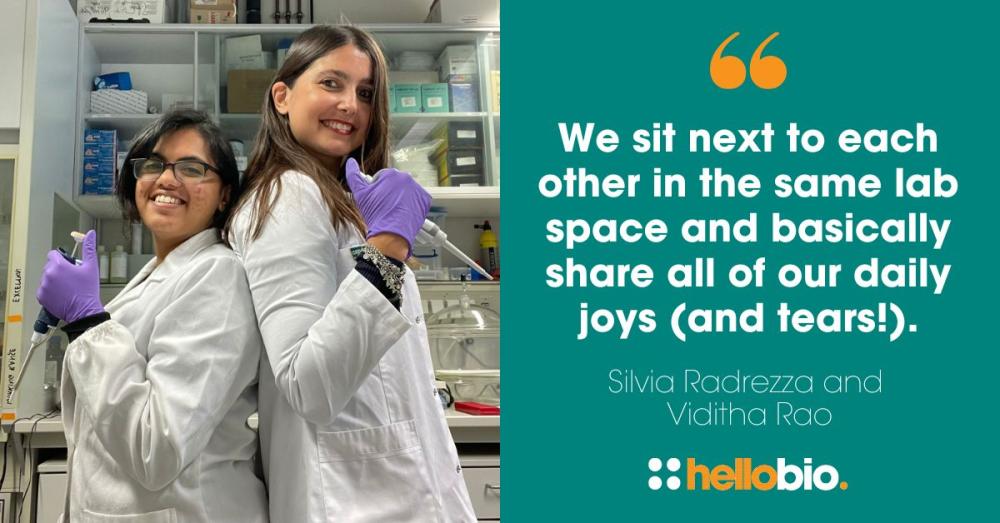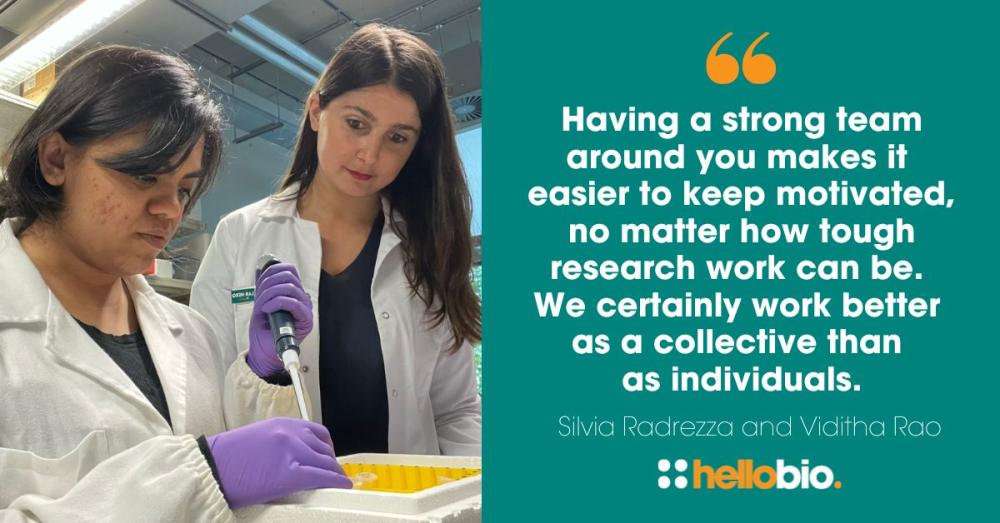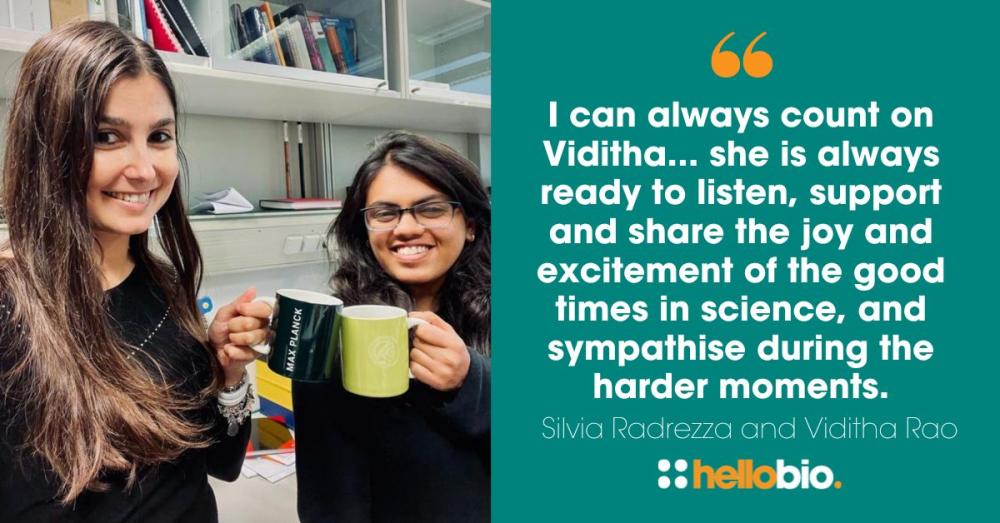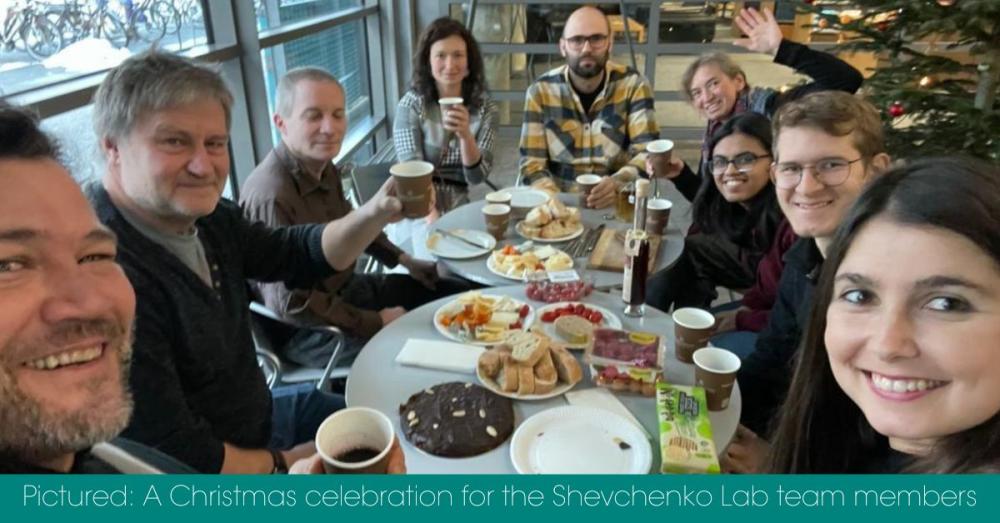Lab Mates: The Value of Friendship in Science Research
A busy science lab can be an intense place to work and that’s why building strong and supportive relationships with your lab colleagues is key to a happy and successful career in STEM. Teamwork is essential in science and strong personal connections can help to drive productivity, build morale and reduce stress for all.
Two life scientists who’ve found the perfect blend of professional respect and personal camaraderie are Silvia Radrezza and Viditha Rao of the Max Planck Institute of Molecular Cell Biology and Genetics in Dresden, Germany. In the Hello Bio Lab Heroes Awards 2023, Silvia and Viditha both nominated each other as their own personal lab heroes, and expressed the warmth and gratitude each has for the other as both a colleague and a confidante.
They have been working together in the Shevchenko Lab for just over two years and in that time have become firm friends. We spoke to the pair about their working relationship, the qualities they admire most in each other, and the importance of friendship and effective teamwork in science research.
- Silvia Radrezza is a postdoc researcher in lipidomics whose work is focused on the role of zonated lipids in different pathologies, including diabetes, liver or colon cancer. She applies laser capture microdissection coupled to high resolution mass spectrometry covering and quantifying the main classes of lipids.
- Viditha Rao is a PhD student in proteomics who is developing a workflow for proteome-wide Absolute Quantification with a Generic Internal Standard using LC-MS/MS. Her team plans to apply this technique to solve biomedical problems such as molecular composition of lipoproteins, vesicles, organelles or entire proteomes.
A shared passion for science
Q: How long have you been working together?
A: Just over 2 years now. We actually work on slightly different projects and topics, with Silvia doing lipidomics while Viditha is focused on proteomics, but this has not hindered our teamwork! We sit next to each other in the same lab space and basically share all of our daily joys (and tears!).
Q: What excites you most about working in STEM?
A: For both of us it was the magic of science that pushed us to pursue our careers in STEM. Now that we are lucky enough to work in life science, it’s the new things we learn each day that challenge us to grow as scientists, and in return help us to grow as people.
The importance of strong working relationships
Q: Why is it important to have a good relationship with your lab colleagues?
A: We spend most of our days here in the lab, so having a strong team around you makes it so much easier to get up in the morning and keep motivated, no matter how tough research work can be. We certainly work better as a collective than as individuals.
Q: Why is it important to recognise and appreciate your work colleagues?
A: Science, maybe more than in other fields, is teamwork based. Expressing your appreciation for a colleague brings greater confidence for them, and with that comes better achievements in the long-term.
Q: Has your work environment always been such a positive one? Have you ever experienced a toxic work culture?
Silvia: So far, I’ve always been quite lucky to work with people with whom I have great relationships. For example, I left my previous lab 3 years ago, yet I still have friends there with whom I chat almost every day.
Viditha: I am really lucky to have been surrounded by people who care for me and want me to be my best self, both as a scientist and a person.
Helping each other to shine
Q: What qualities do you admire most in each other?
Silvia: I can always count on Viditha, both for practical work advice but more importantly, for personal help too. She is always ready to listen, support and share the joy and excitement of the good moments in science, and sympathise during the harder moments. I also admire her willingness to put in extra effort, working late into the night to troubleshoot an experiment or refine a procedure.
Viditha: I admire Silvia’s work ethic, her relaxed attitude and the positive environment she creates in the science lab. Despite her packed schedule, she remains approachable, creating an atmosphere where even the most trivial questions are met with enthusiasm and thoughtful responses. I also admire her balanced approach to both her academic and personal life.
Q: How easy/difficult is it to make time for colleagues in a busy lab environment?
Viditha: If you care enough, you will find the time, and this can be applied to every kind of relationship. Despite the hectic pace of life in the lab, it’s important to prioritise and make time for quality moments to share thoughts and feelings with someone you consider a good friend.
Silvia: Over the years I’ve learned to be flexible and optimise my agenda to squeeze in all the meetings and the writing, but always ensuring I’ve saved enough time for a chat or a coffee with my colleagues, mostly with Viditha as you can imagine!
Q: Viditha described Silvia as a “mentor and guide” - how important is mentorship in science, and what qualities should a good mentor have?
A: Mentorship is important in all facets of life and especially in science where we are facing the unknown every day. For example, having a good mentor can help you to realise that most problems are bigger in your own head than in reality. Mentors help us to look at problems from a different perspective.
Teamwork makes the dream work
Q: Does your team enjoy social activities together outside of the lab?
A: Yes, we actually go on a retreat together for 2 or 3 days every couple of years and, as tradition, we always come together to visit the Christmas market and sometimes go to our lab leader’s house for a team BBQ.
Q: How do you celebrate success as a team?
If the team wins an important grant or has a new paper published, we usually organise a small celebration party with food and drinks for everybody!
Q: What are your top tips for effective teamwork in the lab?
A: It’s essential to have respect for each other and of course to share the same objectives. Science is a competitive field to work in, but try not to be in rivalry with your colleagues. Instead, be there to help, push up if needed and celebrate the victories of others.
And finally...
Q: What are your hopes for the future? Where do you see yourselves working in 10 years time?
Silvia: I would like to work in industry, but at the same time change my field of study a little. Perhaps I will go into editorial work? Who knows!
Viditha: I am in the middle of my PhD so right now my focus is to finish my big long list of things to do! But long-term I plan to stay in the STEM field for sure.
_________________________________________________
Connect with Silvia Radrezza, Viditha Rao & the team at the Shevchenko Lab:
- X(Twitter): @radrezzasilvia / @viditha_rao / @LabShevchenko
- LinkedIn: Silvia Radrezza / Viditha Rao
- Website: https://www.mpi-cbg.de/research/researchgroups/currentgroups/andrej-shevchenko/research-focus/
_________________________________________________
Tell us about your lab mates!
Who’s your best friend in the lab? What makes your colleague extra special? Why is teamwork important to you as a scientist? We’d love to hear your story! Tell us in the comments below, share with us on X(Twitter) @hello_bio, or contact us by email to write a blog or be interviewed about your experiences: hello@hellobio.com
More articles on teamwork & collaboration from Hello Bio
For more tips and advice on effective teamwork and productive collaboration in STEM, check out these great articles on the Hello Bio blog:
- Multidisciplinary Teamwork: Tips for a Productive and Harmonious Workplace
- Creating the Perfect Science TEAM: Together Everyone Achieves More
- How to Successfully Collaborate with a Computational Neuroscientist
________________________________
If you enjoyed this article, why not check out the other resources available on our blog. We are passionate about supporting life scientists including early career life scientists and PhD students - with really low-priced reagents, antibodies and biochemicals, early career scientist grants, and resources to help with both personal and professional development. We know how tough it is - so we hope you find these helpful!
More General Support for Life Scientists
For advice on wellbeing, dissertations, presenting at conferences, wellbeing, PhD support, networking and lots more, we have a huge range of articles to help - just click below:
Save up to 50% on our high purity reagents...
When you get to the stage of planning your experiments, don't forget that we offer a range of low-cost, high-purity agonists, antagonists, inhibitors, activators, antibodies and fluorescent tools (yes - they really are around half the price of other suppliers!) You can use our Quick Multi-Search Tool to search for lots of products in one go, and the range includes:
- Enzyme inhibitors and activators
- Chemogenetic ligands
- Ion channel modulators
- GPCR & ionotropic receptor ligands
- Cell biology reagents & biochemicals
Technical resources
Try our Molarity Calculator: a quick and easy way to calculate the mass, volume or concentration required for making a solution.
Try our Dilution Calculator: an easy way to work out how to dilute stock solutions of known concentrations
We also offer a comprehensive range of technical resources including antibody protocols and methods, product guides and mini-reviews:
And finally, don't forget to check back in with our blog regularly for our latest articles. If there’s something you’d love to contribute to the community, whether that’s an interview or article, drop us a line at hello@hellobio.com
---






